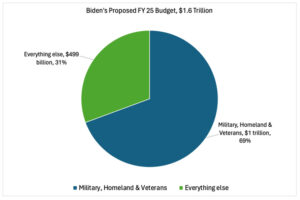Some refer to military spending as a means of creating jobs. This may sound sociopathic. It is also a factual error. Military spending actually eliminates jobs, because more jobs — and better paying jobs — can be had by spending on other industries or by not taxing and spending that money at all.
War has a huge financial cost. Very roughly, the world spends $2 trillion every year on militarism, of which the United States spends about half, or $1 trillion. This U.S. spending also accounts for over half of the U.S. government’s discretionary budget each year. Much of the rest of world spending is by members of NATO and other allies of the United States, although China ranks a distant second.
War and violence also cause trillions of dollars worth of destruction each year. The costs to the aggressor, enormous as they are, can be small in comparison to those of the nation attacked. For example, Iraq’s society and infrastructure were destroyed by a U.S.-led war, along with extensive environmental damage, a refugee crisis, and violence lasting well beyond the war. The financial costs of all the buildings and institutions and homes and schools and hospitals and energy systems destroyed in a war like the 2003-begun war on Iraq is immeasurable.
Wars can cost even an aggressor nation that fights wars far from its shores twice as much in indirect expenses as in direct expenditures. Economists calculate the U.S. wars on Iraq and Afghanistan cost, not the $2 trillion spent by the U.S. government, but a total of $6 trillion when indirect expenses are considered, including future care of veterans, interest on debt, impact on fuel costs, lost opportunities, etc.
Military spending diverts public funds into increasingly privatized industries through the least accountable public enterprise and one that is hugely profitable for the owners and directors of the corporations involved. As a result, war spending works to concentrate wealth in a small number of hands, from which a portion of it can be used to corrupt government and further increase or maintain military spending.
It’s worth considering some of what is lost by current choices. It would cost about $30 billion per year to end starvation on Earth. It would cost about $11 billion per year to provide the world with clean water. About $70 billion per year would eliminate poverty in the United States: Christian Sorensen writes in Understanding the War Industry, “The U.S. Census Bureau indicates that 5.7 million very poor families with children would need, on average, $11,400 more to live above the poverty line (as of 2016). The total money needed . . . would be roughly $69.4 billion/year.” These amounts are tiny fractions of military spending.
Nations could multiply their foreign aid many fold by diverting a small bit of their military spending, and doing so would almost certainly make them safer than the military spending does.

Eirene (Peace) bearing Ploutos (Wealth), Roman copy after Greek votive statue by Kephisodoto (ca. 370 BCE).
Recent Articles:










